From life to business, a community copes with loss during the COVID-19 pandemic
The COVID-19 pandemic has brought many types of losses — loss of loved ones, businesses, identity, career opportunities, community, the college experience. These losses have changed the way community members experience their day-to-day lives.
2.3 million.
That's the estimated worldwide death toll of the COVID-19 pandemic. As shutdowns were implemented, countless livelihoods were altered as business owners, students, workers and others were left stranded, away from what defines them.
And East Lansing has been no exception.
For human biology and biomedical nutrition sophomore Nicole Sceglio, that number is more than just points on a chart. One of them is her father, Vince Sceglio. He died on Sept. 2 at the age of 57.
"He was our biggest fan, just a great role model all-around," Sceglio said. "He was a hockey coach for my brothers, and he got to know all the kids that he coached on a really personal level and he mentored them, and I always believed that he mentored them to be more than just good hockey players. He mentored them to be good leaders, good students, good people in the world."
Sceglio's father was a physician at the Henry Ford Hospital, where he worked through the pandemic. She said that this is likely where he picked up COVID-19, having intubated and cared for patients.
She remembers him as a constantly joke-cracking, hardworking, involved father. He was passionate about hockey, and she remembered going to hockey games with him as some of her favorite memories.
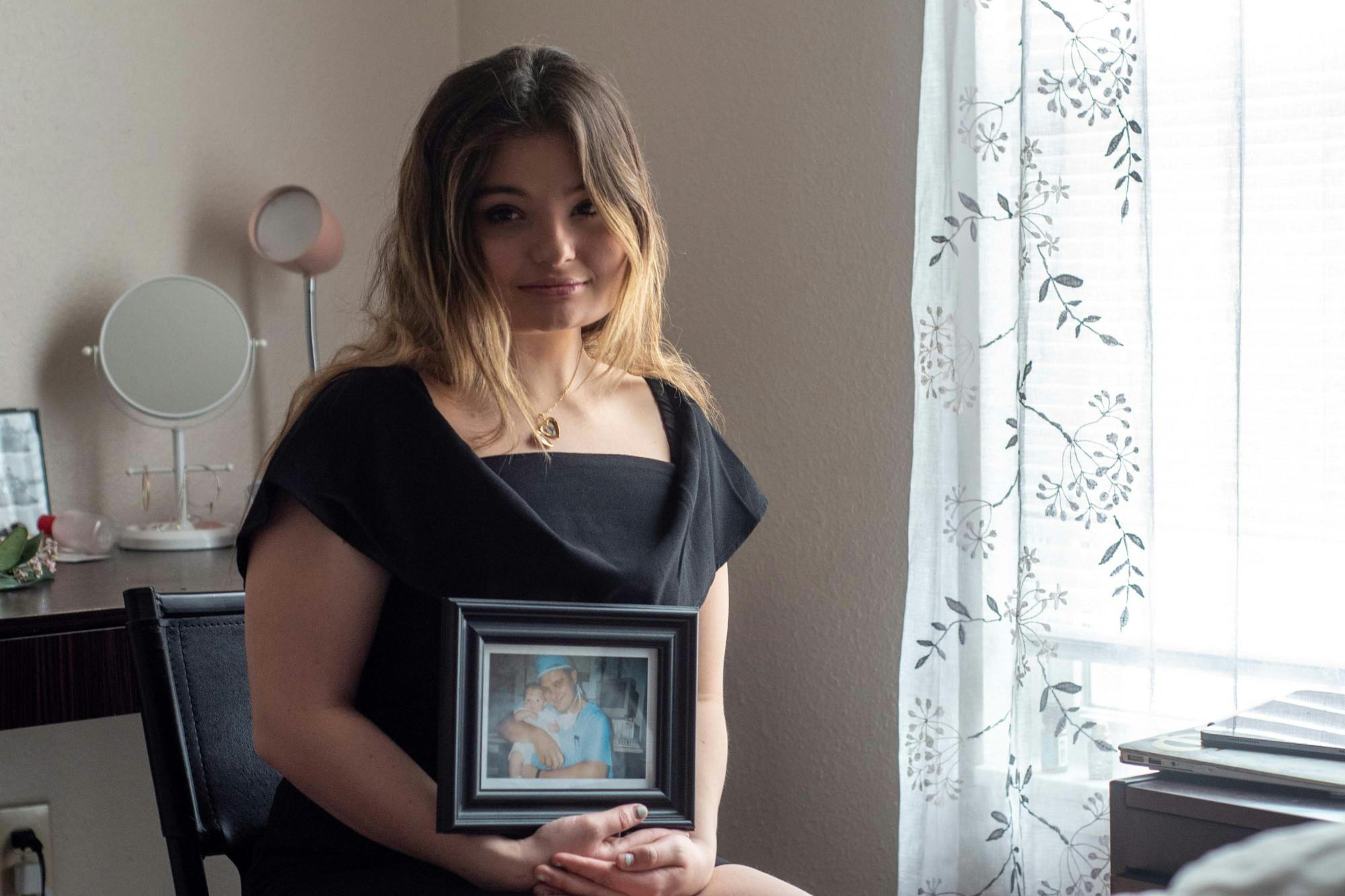
Lauren DeMay / The State News
Sceglio poses with a picture she keeps in her room of her dad. Nicole Sceglio, a sophomore studying human biology, lost her father to COVID-19 in September of 2020. Shot on Feb. 25, 2021.
Sceglio said that he was healthy, not having smoked or drank during his life, and since COVID-19 has a high survivability rate, she wasn't expecting any bad outcomes during his time in the hospital. They were told that his odds were good.
But, things took a turn for the worse, and after having been put on a ventilator, the decision was made to pursue a treatment called extracorporeal membrane oxygenation, or ECMO, in which blood is oxygenated and pumped outside of the heart and lungs, allowing for these organs to heal. Sceglio's father was one of the first patients in the Henry Ford Health System to undergo ECMO for COVID-19.
It was the first day of school when Sceglio got the call from her mother, telling her that she needed to come home to Grosse Pointe Farms. She was in East Lansing at the time.
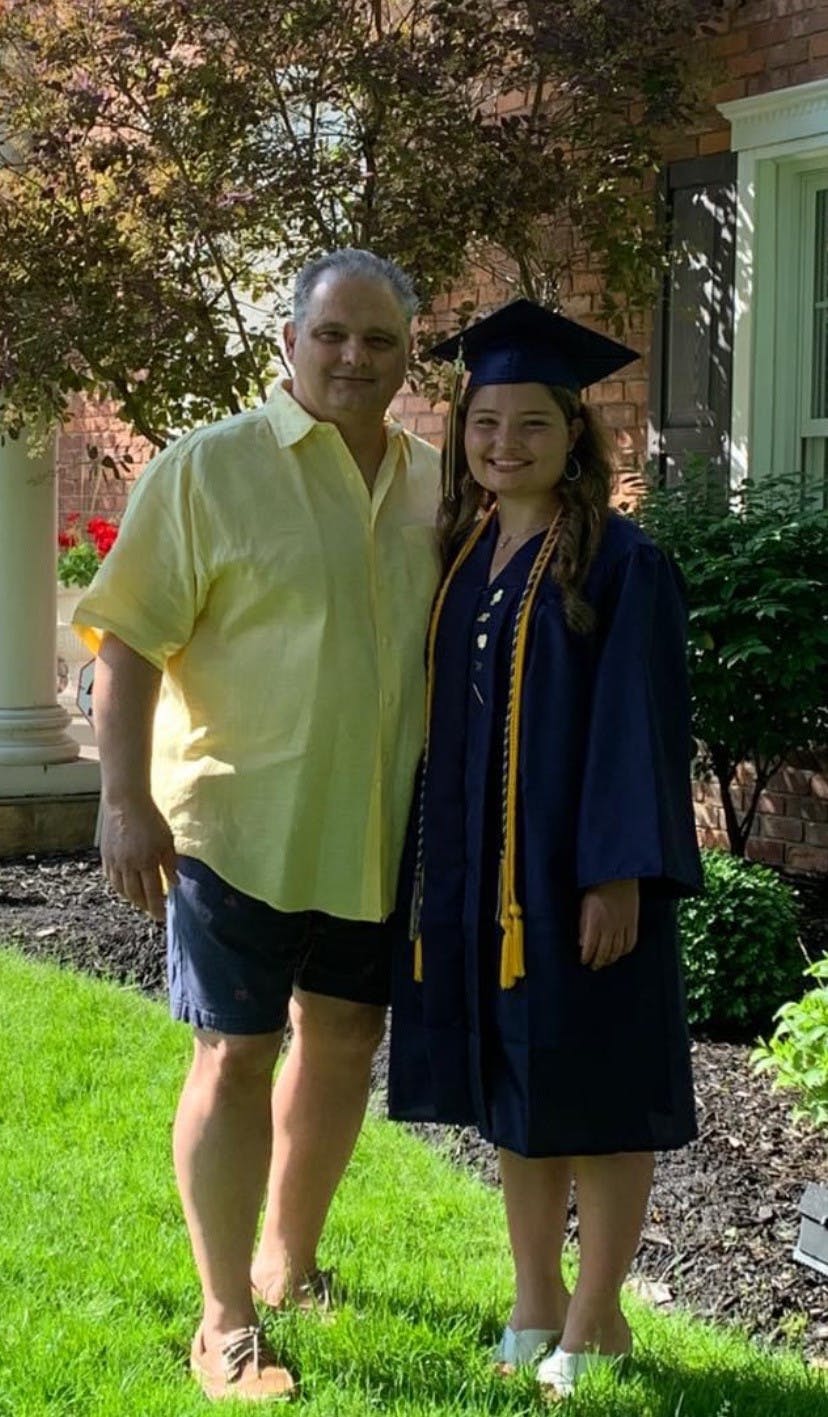
Photo courtesy Nicole Sceglio
Upon arriving at the hospital, she was allowed to put on a hazmat suit and a mask to see her dad for the last time. She hadn't seen him since he was hospitalized, due to visiting restrictions, and now he was unresponsive. Sceglio said it all happened so fast that she didn't really process it.
"I was just so in shock the whole time," Sceglio said. "I honestly only very recently came to accept it because in my head it still doesn't seem real. It still feels like I have two parents and it's weird seeing the extra chair at the dinner table."
The pandemic has made the grieving process more difficult with lockdowns having changed access to support systems as resources such as therapy moved online and seeking in-person interactions is discouraged. But Sceglio said that MSU provided a lot of the help she needed.
"I went to CAPS (Counseling and Psychiatric Services) twice a week first semester," Sceglio said. "All my professors were super accommodating, I was able to get extra time on my exams, I was able to have extensions on assignments because I missed the first month of school, and I was really lucky because I was ready to drop out."
Through her experience, Sceglio understands the need for COVID-19 mitigation strategies, including lockdown policies. She says that she wants to see a return to in-person classes and wants things to go back to normal but sees the necessity of holding off. She described her frustration in seeing people avoid mitigation strategies, such as wearing masks, social distancing and avoiding gatherings.

Photo courtesy Nicole Sceglio
"It's so weird to me how people are watching the numbers go up, now with the vaccine, there's a light at the end of the tunnel finally, but before, I was frustrated and upset," Sceglio said. "I knew actions like that were just perpetuating it. There are healthcare workers on the frontline, risking it all like my dad was."
Sceglio has had the ability to cope with her loss, but she said that it's something that she will always be sad about, having experienced this loss so early.
"I really expected my dad to be at my college graduation, I expected my dad to walk me down the aisle at my wedding," Sceglio said. "It was never a thought in my mind that he was going to die this early."
The Vincent A. Sceglio Foundation was created to honor his legacy in the realm of hockey. The foundation donates 100% of its proceeds to paying for team ice bills, uniforms, practice equipment and the sponsorship of hockey camps.
For downtown East Lansing, the usual Michigan State crowd has returned only at a fraction of its normal size and a handful of businesses have shut down permanently in Downtown East Lansing. This includes a number of community staples, such as Espresso Royale, Quality Dairy and Blaze Pizza.
Another business, Campus Street Sportswear, shut its doors for good in December. Owner Dave Smaby said that they couldn't manage through the pandemic, especially without a community to sell to.
"Mid-August was really when we were still sort of hoping that things might work out, it wasn't really certain, we were still preparing for a fall to happen," Smaby said. "But as soon as the notice came out that freshmen weren't going to be on campus, that football was going to be canceled, that's when we started getting nervous."

Lauren DeMay / The State News
Campus Street Sportsware, located on East Grand River Avenue, was scheduled to close down indefinitely before 2021. Everything in store is 30% regular price. Shot on Oct. 21, 2020.
Campus Street Sportswear, formerly located on East Grand River Avenue, was a collegiate outfitter, selling MSU-themed apparel and decorations. After that initial worry through late summer and months of consideration, Smaby announced their closure on Oct. 21, 2020.
"It was all kind of confirmed in early September when our sales were garbage and it was really about 30 days of coming to the conclusion, the realization, that it was over," Smaby said. "It was hard to come to grips with reality, trying to figure out a way to make things work, but just denying the numbers. Eventually, (we) had to accept it and mid-October was when we decided to start doing the liquidations."
Smaby said that the loss of his business has represented a loss in identity, having owned Campus Street Sportswear for 11 years.
"I never realized how much emphasis we put on our careers or our profession to define who we are as people," Smaby said. "It's unfortunate that that's the case sometimes, but since you do spend so much time at work during the day, during your waking hours, it becomes a big part of your life. When it gets taken away from you like this, it's demoralizing, it's upsetting. You are kind of lost, not really sure what to do."
"It was hard to come to grips with reality, trying to figure out a way to make things work, but just denying the numbers."
Campus Street Sportswear owner Dave Smaby
As for now, Smaby is still figuring out what to do next and is taking the time to enjoy life outside of the business in the meantime.
"I'm doing alright, I think that there's still plenty of business stuff I need to do, plenty of things to sell," Smaby said. "Mostly just taking the time to relax and spend some time with the family and enjoy the peace and quiet, it was kind of a crazy four months there with liquidations."
While businesses have struggled across the board and the pandemic has caused an economic downturn, opportunities have also been scarce. For nursing senior, Taylor Swartz, this came in the form of a canceled internship.
Swartz was set for and accepted to an internship with the University of Michigan Hospital System in Ann Arbor. That came crashing down on March 11, 2020, when the state went into lockdown.
"It was really disappointing because I've done a lot of experiences to best prepare myself to be qualified to get an opportunity like that and to learn from these nurses," Swartz said.
Swartz said that this was the perfect example of an opportunity that she had worked so hard for during these past years at MSU. For this program, she had to put in extra effort in order to be considered. Answering essay questions and gathering letters of recommendation was only part of it.
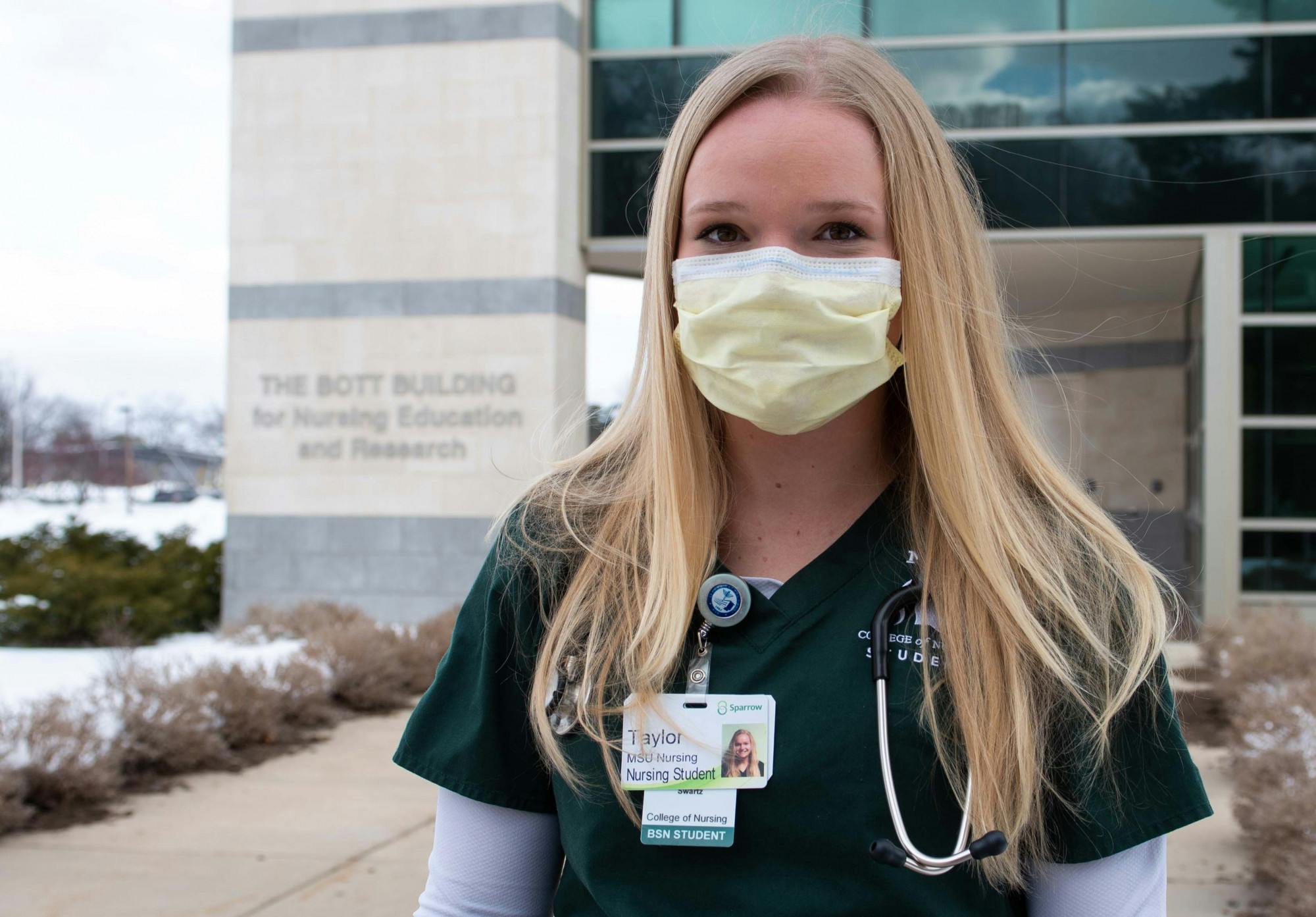
Lauren DeMay / The State News
Taylor Swartz, a senior at Michigan State, is a nursing student associated with Sparrow Hospital. Swartz lost out on an internship due to COVID-19. Shot on Feb. 12, 2021.
"It was a very difficult process and it was something that I had spent a lot of time preparing for, talking to career coaches, interviewing techniques to prepare myself for this, and I've prepared all throughout college to get these types of experiences, gotten a lot of different jobs just to best prepare myself to work at a place like this," Swartz said.
The University of Michigan Hospital System was named the 5th best hospital system in the nation. Swartz said hundreds of people apply for the internship, but she was among only 12 students that were called in for an interview, and nine that were actually accepted.
In this position, Swartz would have shadowed a nurse for ten weeks over the summer of 2020, clocking in and out at the same time as they do, while gathering expertise in the field. But after the program was canceled, she had to seek other work, which she found as a certified nursing assistant at Burcham Hills, a nursing home in East Lansing.
As part of MSU's nursing program, Swartz also engages in clinicals, gaining experience at Sparrow Hospital as a frontline worker. Her clinical is in labor and delivery, which she said has changed quite a bit due to the pandemic. New mothers are relying on video communication, such as FaceTime, to allow family members to be "in the delivery room" during birth.
"It was really disappointing because I've done a lot of experiences to best prepare myself to be qualified to get an opportunity like that."
Nursing senior Taylor Swartz
Swartz has taken the opportunity to appreciate her last semester of college, saying that she wants to take the time to appreciate her friends, roommates and to focus on preparing for the National Council Licensure Exam (NCLEX), to become a registered nurse. According to the College of Nursing, MSU had a 93% first-time pass rate on the NCLEX in 2018, which is well above the national average of 86%.
"When I graduate, I would like to apply to labor and delivery units or just different women's health units and get some experience there and eventually go back to get an advanced degree, whether that's a master's or DNP (Doctor of Nursing Practice)," Swartz said.
Other institutions outside of business have had to adapt, too, including the way people practice religion.
Often a communal experience, going to a church, mosque, temple or synagogue hasn't been considered a safe option during the pandemic. Thasin Sardar, a member of the Board of Trustees of the Islamic Society of Greater Lansing, said that they made an easy and early decision to close the Islamic Center. But, this hasn't come without obstacles.
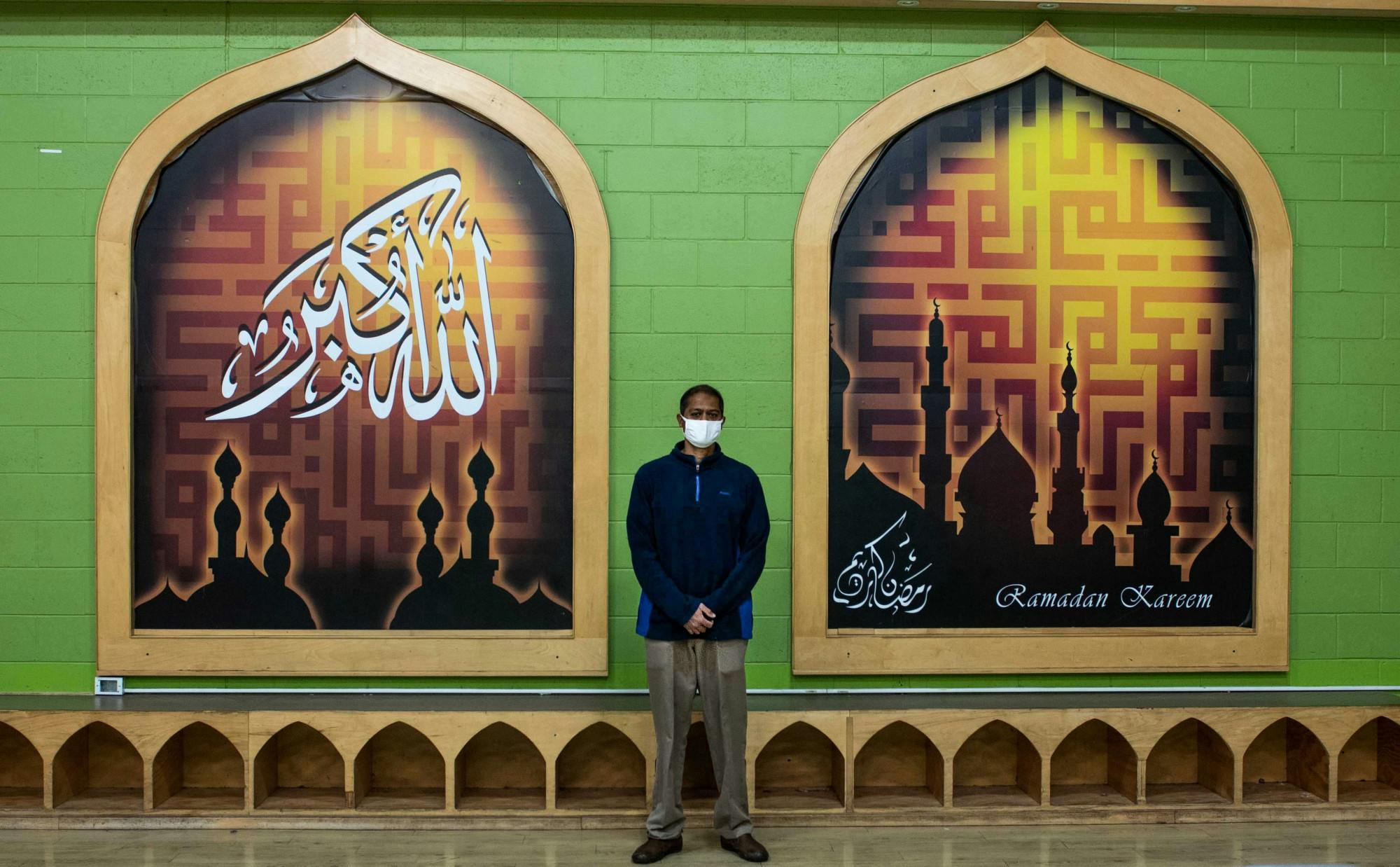
Lauren DeMay / The State News
Thasin Sardar poses in front of a mural in the Islamic Center's gymnasium, which is also a temporary classroom for students through the center's schooling program. Shot on Feb. 10, 2021.
Sardar has been a trustee for a year now, as a volunteer, where he ensures the balance between spiritual and social needs and practicality from a safety standpoint.
"For us, fortunately, as a board, we chose to seek the counsel of medical professionals within our own community and right at the onset of the pandemic, when we asked them for their opinion, their advice was to not make any compromises and close down the facility until we understood the situation," Sardar said. "Sure enough, we closed down even before the governor had issued the executive order to go on a lockdown, and a week after, we all had to comply regardless."
He said that faith-practicing members of the community have asked them to make greater efforts in opening up, but Sardar has asked for greater understanding.
But, Sardar admits that community worship is a large part of Islamic tradition, and the current lack thereof will need to be addressed in order to rebuild after the pandemic.
"Tradition encourages us to come and pray together at the Islamic Center, and if you're not able to, you pray at home, but there's deeper self-appreciation for one to come to the Islamic Center and pray together because it builds a sense of community, togetherness, brotherhood and sisterhood that is a basis of communal worship of Islam," Sardar said. "That has certainly taken a hit and we hope to seek to rebuild that once the pandemic is over."
Thasin Sarder, a religious leader part of the East Lansing Islamic Center, prays in the center's prayer room on Feb. 10, 2021. The center is taking preventative measures to stop the spread of COVID-19 by placing markers in the prayer room to indicate six feet of distance between each person.
Lauren DeMay / The State News
In order to make up for this short-coming of community, the Islamic Center has been hosting online events as well as smaller, in-person daily prayers. Sardar also encourages the public to seek out the Islamic Center's spiritual leader, Imam Sohail Chaudhry, if in need of spiritual counsel.
Ramadan, a Muslim holy month, is usually celebrated with fasting, increased prayer and togetherness. In 2020, it fell between April 23 and May 23, so the Islamic Center was completely closed. Sardar said that the community was understanding of the closure, but as the situation around COVID-19 has changed, he expects that Ramadan will look much more normal this year.
Sardar is looking forward to rebuilding faith and community once the pandemic takes a better turn.
"Although this seems to be taking a little longer than we all thought it might, as they say, the light is at the end of the tunnel right now," Sardar said. "Hopefully with more people getting vaccinated and herd immunity building up, we are looking forward to opening up a little more as soon as the situation permits."
The effects of the pandemic have altered other lifestyle aspects, too. College students are missing out on "the college experience": being on campus, attending classes and meeting new people. MSU elementary education freshman Erin Lundsted said that having to trade this experience for taking Zoom classes in her hometown was less than ideal.
"When we all got the email that we weren't going to be able to come down to campus ... I was really sad, I'm not going to lie."
Elementary education freshman Erin Lundsted
"When we all got the email that we weren't going to be able to come down to campus, I think it was a week before I was supposed to move in the dorms, so I had a majority of my things packed up," Lundsted said. "When I found out, I was really sad, I'm not going to lie."
Not only is she missing out on this experience, but having graduated from Mount Pleasant High School, she got the end of her senior year taken away from her. For Lundsted, this meant no normal prom or commencement ceremony, no normal end to her high school career.
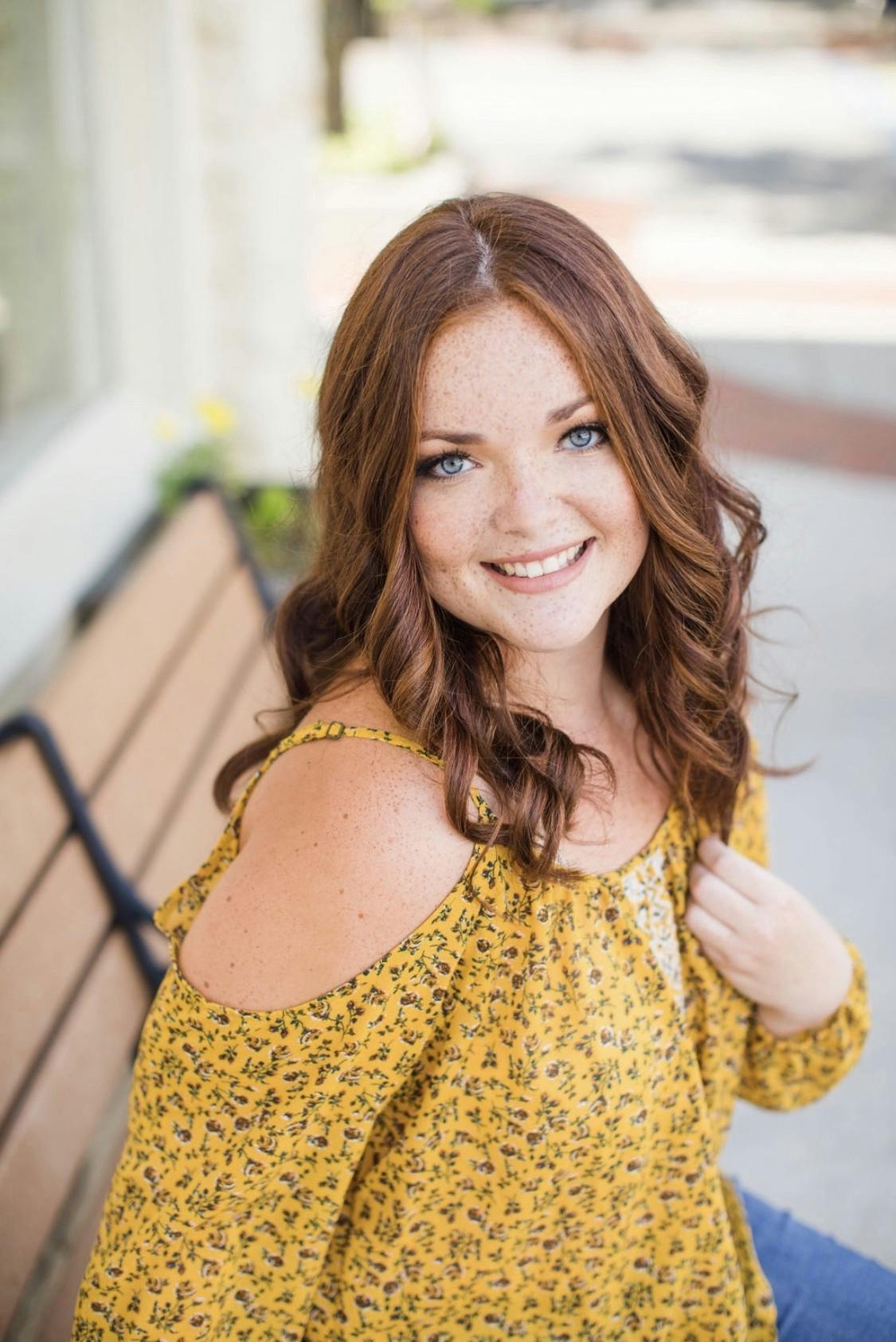
Photo courtesy Erin Lundsted
Now, as an online student at MSU, Lundsted attends class with low motivation, saying that it just feels like they're constantly doing assignments and going from Zoom to Zoom, making her classes more difficult given these circumstances.
While the pandemic has created grief from a variety of different sources, mental health resources have persisted. Counselor Abby Waller, from MSU CAPS, recognized that the circumstances of the pandemic can make it more difficult to cope with loss.
"These COVID times can be especially difficult for the grieving due to the isolation many are experiencing," Waller said. "So it is more important than ever that friends and family think creatively about providing support. Grief support groups can be a helpful way to learn about the grieving process and can help us to connect with others who have experienced a similar loss and can help us feel less lonely and normalize the grieving process. Just sitting in a room (or on zoom) with others who can personally relate to the pain can be very powerful and healing."
Waller also said that the pandemic has made it harder to accept the loss of loved ones.
"It also can be harder to accept the reality of the loss of loved one if we have been unable to see them and be with them at their death or unable to go to a funeral or gather with loved ones due to COVID restrictions," Waller said.
She also reminded that taking care of oneself is important due to the fact that grief can impact all areas of life, including social, behavioral and physical aspects.








